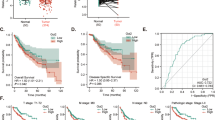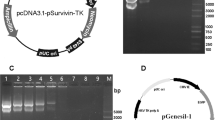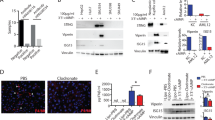Abstract
Hepatocellular carcinoma (HCC), the third leading cause of cancer death in the world, is the most general type of primary liver cancer. Although current treatment modalities, such as liver transplantation, resection, percutaneous ablation, transarterial embolization, chemotherapy and radiotherapy are potentially curative, these methods are not universally applicable to all of HCC patients, especially for those with poor prognosis in which no effective remedy is available. Therefore, development of novel therapeutic approach for the treatment of HCC is urgently needed. In the current study, we developed a promising HCC-targeted gene therapy vector driven by liver cancer-specific α-fetoprotein promoter/enhancer coupled to an established platform technology. The activity of this expression vector is comparable with or even higher than that of strong cytomegalovirus (CMV) promoter and exhibits strong promoter activity in liver cancer cells/tumors, but has nearly no or very low activity in normal cells/organs in vitro and in orthotopic animal models in vivo. Its cancer specificity exceeds that of the CMV promoter, which expresses non-specifically in both normal and tumor cells. In addition, targeted expression of a therapeutic BikDD, a mutant of proapoptotic gene Bik effectively and preferentially killed liver cancer cells, but not normal cells and significantly repressed growth of HCC tumors, and prolonged survival in multiple xenograft and syngeneic orthotopic mouse models of HCC through intravenous systemic gene delivery. Importantly, systemic administration of BikDD by our expression vector exerted no systemically acute toxicity compared with CMV-BikDD in mice. Taken together, this study elucidates a relatively safe and highly effective and specific systemic gene therapy strategy for liver cancer, and is worthy of further development for future clinical trials.
This is a preview of subscription content, access via your institution
Access options
Subscribe to this journal
Receive 50 print issues and online access
$259.00 per year
only $5.18 per issue
Buy this article
- Purchase on Springer Link
- Instant access to full article PDF
Prices may be subject to local taxes which are calculated during checkout








Similar content being viewed by others
References
Abelev GI, Eraiser TL . (1999). Cellular aspects of alpha-fetoprotein reexpression in tumors. Semin Cancer Biol 9: 95–107.
Avila MA, Berasain C, Sangro B, Prieto J . (2006). New therapies for hepatocellular carcinoma. Oncogene 25: 3866–3884.
Bui LA, Butterfield LH, Kim JY, Ribas A, Seu P, Lau R et al. (1997). In vivo therapy of hepatocellular carcinoma with a tumor-specific adenoviral vector expressing interleukin-2. Hum Gene Ther 8: 2173–2182.
Chen JS, Liu JC, Shen L, Rau KM, Kuo HP, Li YM et al. (2004). Cancer-specific activation of the survivin promoter and its potential use in gene therapy. Cancer Gene Ther 11: 740–747.
Chen SH, Hu CP, Chang CM . (1992). Hepatitis B virus replication in well differentiated mouse hepatocyte cell lines immortalized by plasmid DNA. Cancer Res 52: 1329–1335.
El-Serag HB, Rudolph KL . (2007). Hepatocellular carcinoma: epidemiology and molecular carcinogenesis. Gastroenterology 132: 2557–2576.
Guan M, Rodriguez-Madoz JR, Alzuguren P, Gomar C, Kramer MG, Kochanek S et al. (2006). Increased efficacy and safety in the treatment of experimental liver cancer with a novel adenovirus-alphavirus hybrid vector. Cancer Res 66: 1620–1629.
Hoofnagle JH . (2004). Hepatocellular carcinoma: summary and recommendations. Gastroenterology 127 (Suppl 1): S319–S323.
Ido A, Uto H, Moriuchi A, Nagata K, Onaga Y, Onaga M et al. (2001). Gene therapy targeting for hepatocellular carcinoma: selective and enhanced suicide gene expression regulated by a hypoxia-inducible enhancer linked to a human alpha-fetoprotein promoter. Cancer Res 61: 3016–3021.
Izumi R, Shimizu K, Kiriyama M, Hashimoto T, Urade M, Yagi M et al. (1992). Alpha-fetoprotein production by hepatocellular carcinoma is prognostic of poor patient survival. J Surg Oncol 49: 151–155.
Kim JW, Wang XW . (2003). Gene expression profiling of preneoplastic liver disease and liver cancer: a new era for improved early detection and treatment of these deadly diseases? Carcinogenesis 24: 363–369.
Lemken ML, Wybranietz WA, Schmidt U, Graepler F, Armeanu S, Bitzer M et al. (2005). Expression liver-directed genes by employing synthetic transcriptional control units. World J Gastroenterol 11: 5295–5302.
Llovet JM, Burroughs A, Bruix J . (2003). Hepatocellular carcinoma. Lancet 362: 1907–1917.
Lu SY, Sui YF, Li ZS, Pan CE, Ye J, Wang WY . (2003). Construction of a regulable gene therapy vector targeting for hepatocellular carcinoma. World J Gastroenterol 9: 688–691.
Ma SH, Chen GG, Yip J, Lai PB . (2010). Therapeutic effect of alpha-fetoprotein promoter-mediated tBid and chemotherapeutic agents on orthotopic liver tumor in mice. Gene Ther 17: 905–912.
Mawatari F, Tsuruta S, Ido A, Ueki T, Nakao K, Kato Y et al. (1998). Retrovirus-mediated gene therapy for hepatocellular carcinoma: selective and enhanced suicide gene expression regulated by human alpha-fetoprotein enhancer directly linked to its promoter. Cancer Gene Ther 5: 301–306.
Nakabayashi H, Hashimoto T, Miyao Y, Tjong KK, Chan J, Tamaoki T . (1991). A position-dependent silencer plays a major role in repressing alpha-fetoprotein expression in human hepatoma. Mol Cell Biol 11: 5885–5893.
Parkin DM, Bray F, Ferlay J, Pisani P . (2005). Global cancer statistics, 2002. CA Cancer J Clin 55: 74–108.
Ren XW, Liang M, Meng X, Ye X, Ma H, Zhao Y et al. (2006). A tumor-specific conditionally replicative adenovirus vector expressing TRAIL for gene therapy of hepatocellular carcinoma. Cancer Gene Ther 13: 159–168.
Schafer DF, Sorrell MF . (1999). Hepatocellular carcinoma. Lancet 353: 1253–1257.
Sher YP, Tzeng TF, Kan SF, Hsu J, Xie X, Han Z et al. (2009). Cancer targeted gene therapy of BikDD inhibits orthotopic lung cancer growth and improves long-term survival. Oncogene 28: 3286–3295.
Shi YJ, Gong JP, Liu CA, Li XH, Mei Y, Mi C et al. (2004). Construction of a targeting adenoviral vector carrying AFP promoter for expressing EGFP gene in AFP-producing hepatocarcinoma cell. World J Gastroenterol 10: 186–189.
Stillwagon GB, Order SE, Guse C, Leibel SA, Asbell SO, Klein JL et al. (1991). Prognostic factors in unresectable hepatocellular cancer: Radiation Therapy Oncology Group Study 83-01. Int J Radiat Oncol Biol Phys 20: 65–71.
Suriawinata A, Xu R . (2004). An update on the molecular genetics of hepatocellular carcinoma. Semin Liver Dis 24: 77–88.
Takahashi M, Sato T, Sagawa T, Lu Y, Sato Y, Iyama S et al. (2002). E1B-55K-deleted adenovirus expressing E1A-13S by AFP-enhancer/promoter is capable of highly specific replication in AFP-producing hepatocellular carcinoma and eradication of established tumor. Mol Ther 5: 627–634.
Templeton NS, Lasic DD, Frederik PM, Strey HH, Roberts DD, Pavlakis GN . (1997). Improved DNA: liposome complexes for increased systemic delivery and gene expression. Nat Biotechnol 15: 647–652.
Xie X, Hsu JL, Choi MG, Xia W, Yamaguchi H, Chen CT et al. (2009). A novel hTERT promoter-driven E1A therapeutic for ovarian cancer. Mol Cancer Ther 8: 2375–2382.
Xie X, Xia W, Li Z, Kuo HP, Liu Y, Ding Q et al. (2007). Targeted expression of BikDD eradicates pancreatic tumors in noninvasive imaging models. Cancer Cell 12: 52–65.
Zufferey R, Donello JE, Trono D, Hope TJ . (1999). Woodchuck hepatitis virus posttranscriptional regulatory element enhances expression of transgenes delivered by retroviral vectors. J Virol 73: 2886–2892.
Acknowledgements
This work was supported by grants from DOH97-TD-I-111-TM003, DOH98-TD-I-111-TM002, NHRI-EX98-9603BC (to L-YL), DOH98-TD-G-111-030 (to M-CH), NSC96-3111-B-039, NSC97-3111-B-039 and DOH99-TD-C-111-005 (to M-CH and L-YL).
Author information
Authors and Affiliations
Corresponding authors
Ethics declarations
Competing interests
The corresponding author, Dr Mien-Chie Hung, is an inventor on patents covering BikDD as a therapeutic agent filed with the University of Texas MD Anderson Cancer. The other authors declare no conflict of interest.
Additional information
Supplementary Information accompanies the paper on the Oncogene website
Supplementary information
Rights and permissions
About this article
Cite this article
Li, LY., Dai, HY., Yeh, FL. et al. Targeted hepatocellular carcinoma proapoptotic BikDD gene therapy. Oncogene 30, 1773–1783 (2011). https://doi.org/10.1038/onc.2010.558
Received:
Revised:
Accepted:
Published:
Issue Date:
DOI: https://doi.org/10.1038/onc.2010.558
Keywords
This article is cited by
-
Prostate cancer cell-specific BikDDA delivery by targeted polymersomes
Applied Nanoscience (2020)
-
DNA Polymerases as targets for gene therapy of hepatocellular carcinoma
BMC Cancer (2015)
-
Signaling cross-talk in the resistance to HER family receptor targeted therapy
Oncogene (2014)
-
Efficient systemic DNA delivery to the tumor by self-assembled nanoparticle
Journal of Nanoparticle Research (2014)



